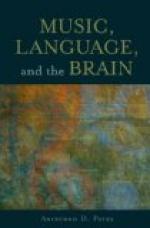CHAPTER III
THE TEACHING OF VOICE PRODUCTION AND SONGS
It is perhaps more rare to find a successful teacher of songs than of any other subject in the school curriculum. There are many reasons for this. In many cases a visiting teacher takes the work, who finds it difficult to learn the names of all the children in one lesson a week, and who therefore starts at a disadvantage. Then the size of the class for songs is always larger than that of classes in other subjects, and there is therefore more inducement to inattention on the part of the children.
Nothing is more pitiful than to see a young, inexperienced mistress grappling with a large class of healthy, restless children, who know from experience that the weekly song lesson may be turned to good account for their own little games!
There is, of course, the born teacher, who sends an electric shock through the room directly she enters it, and who, without asking for it, secures instant silence and eager attention. Such people are rare, and it must be our task now to give a few practical suggestions to those less fortunate people who do not possess the innate gift, but who are willing to learn.
To begin with, the teacher of songs must have real personality; and if she does not possess this by nature, she must do her best to develop what she has. She must be full of vitality, she must understand children, and, above all, she must be genuinely fond of music, in such a way that she cannot do without it. The last qualification often implies a certain sensitiveness, which finds a difficulty in accommodating itself to a workaday world, where people have little time, or inclination, to study the ‘moods’ of others. Very artistic people are a well-known difficulty to the authorities of schools. In order to excel in their art, they must not only have a ‘capacity for taking pains’, but a reserve store of emotional force, on which they draw for self-expression through their art. Now the possession of such a reserve store does not always imply a power of keeping it in reserve! During the course of training the attention of such people should be directed to the high ideals underlying all true educational work; they should realize the real function of music in education—that it is not to be taken as a mere accomplishment, or technical art, but as a means of self-expression.
We will now consider a special case. Let us suppose that a new mistress is taking a song lesson with a large class of children, who have the reputation of being troublesome to manage. On entering the classroom it is a good plan to go straight to the platform, without speaking a word to the children on the way, whatever they may be doing. From this vantage ground the teacher should look the class over for a few seconds, still without speaking. There is nothing more impressive to a restless class than the




